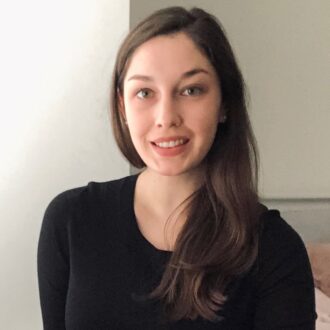Thesis: The Gorgona Paradigm: Private Art Practice in Socialist Yugoslavia
Supervisor: Dr. Klara Kemp-Welch
My thesis explores the dynamics of the Gorgona group’s collectivity in Zagreb through a wide range of material and activities, asserting that Gorgona created and maintained a private space for itself parallel to the official arts scene of socialist Yugoslavia. The nine individuals who created Gorgona’s society in the 1960s (Miljenko Horvat, Marijan Jevšovar, Julije Knifer, Ivan Kožarić, Đuro Seder, Josip Vaništa, Dimitrije Bašičević, Matko Meštrović, and Radoslav Putar), retained their own careers and pursued independent aesthetic investigations. My research proposes a theorisation of the Gorgonic gaze, to define the group’s collective outlook rooted in trauma and nihilism that marked it apart from the aesthetics of Socialist Modernism. By looking at the group as a whole as well as individual artistic legacies after the group’s dissolution in 1966, my thesis demonstrates Gorgona’s steadfast outlook over time in relation to changing discourses and perspectives on art.
During Gorgona’s active years, I argue that its self-formed society was modelled on the workers councils that proliferated in Yugoslavia in a system called self-management. These principles of self-organisation guided the group’s administration, yet members came to emulate the trappings of bureaucracy in a mocking way, expressing a critical citation of the government. The performance of being a collective through self-archiving and self-managed activities engendered self-institutionalisation. Even as the members came to be increasingly acknowledged individually after the group’s dissolution in 1966, their work and legacy retained the Gorgona designation. I propose that the oscillation between the individual and the collective identity, or the private and the social, has been key to the group’s success and the expansion of its renown in an increasingly globalised art history. Gorgona, as both collective and individual, was adaptable across the shifting terrain characterised by post–Cold War transition. This flexible paradigm operated according to the same dialectical logic that saw the passage from the conceptual to the global contemporary.
Education
2018 – present: PhD Candidate in Art History, Courtauld Institute of Art, London
2012 – 2014: MA in Museum Studies, New York University
2008 – 2011: BA in Anthropology, Magna Cum Laude, University of Oklahoma, Norman, OK, minor in Art History, Member of Phi Beta Kappa Honors Society
Research Interests
- Post-war international art
- Conceptual practices
- Artists’ journals and texts
- Performance studies
- Cold War politics
- Global perspectives in art history
Publications
‘Theory and Methods of Exploring Alternative Cultures. New Approaches’ co-authored with Katalin Cseh-Varga, Ondrej Daniel, Kristóf Nagy, Terje Tomistu, Marko Zubak and Rolf Werenskjold in Creative Dissent: Alternative Cultures during Socialism and Beyond, 1945-1991, edited volume (forthcoming).
‘Artist Interview: Bella Radenović and Chelsea Pierce in Conversation with Slavs and Tatars’ in immediations, no. 17 (London: Courtauld Institute of Art, 2020). Available online.
Günther Förg: A Fragile Beauty, editorial assistance by Chelsea Pierce and Michael Neff. Dallas Museum of Art / Yale University Press, 2018.
‘Linnea Glatt’ in Linnea Glatt: Plot Line, Barry Whistler Gallery, Dallas, 2018.
‘Exhibition and Publication History of the Large Rod Series’ in Counterpoint: Sculpture, Music and Walter De Maria’s Large Rod Series, Dallas Museum of Art / Yale University Press, 2017.
‘Exhibition Chronology’ in Jackson Pollock: Blind Spots, London: Tate Publishing, 2015.
Curatorial Experience
Soft Focus, Curator, Dallas Museum of Art, June 2018 – September 2018
Notes from the center, Curator, Vignette Women’s Art Fair, The Women’s Museum, Fair Park, Dallas, TX, April 5-9, 2017
Primary Research: Sean Cairns, Linnea Glatt & James Sullivan, Curator, St. Paul Place, Dallas, TX, November 5, 2017 – January 14, 2018
Curatorial Assistant for Contemporary Art, Dallas Museum of Art, 2014-2018
Presentations
Gorgona in Three Acts: Performing a Position on Anti-Painting, 3rd year PhD symposium, Courtauld Institute of Art, June 2021.
“Our Most Learned Society”: Gorgona’s performance of self-management, Creative Dissent: Alternative Cultures during Socialism and Beyond, 1945-1991 conference, Riga, Latvia, October 2020.
The Gorgonic gaze: Visualising Gorgona’s praxis through a filmic eye, 2nd year PhD colloquium, Courtauld Institute of Art, May 2020.
Other Activities
Teaching Assistant, MA Core Methodologies, autumn term 2019.
Associate Editor, immediations, post-graduate research journal, 2020.
Decolonization reading group, Courtauld Institute of Art, December 2020 – present.
Virtual studio visits, Residency Unlimited, Brooklyn, NY for Young Visual Artists Award program, March 2021.
Juror, Radoslav Putar Award, Split, Croatia, June 2021.






